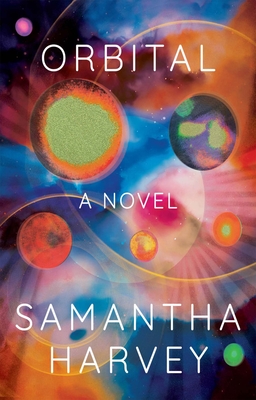
Put six people from five countries into the International Space Station orbiting Earth and leave them there for several years. Now write about a single day, which encompasses sixteen orbits, so sixteen sunrises, sixteen sunsets. I immediately imagined around a dozen different stories that could come out of this premise.
I never imagined Samantha Harvey’s Orbital.
I am stunned by the gorgeous language. When Chie sees the islands of her native Japan, they look like “a trail of drying footprints. Her country is a ghost haunting the water.”
When Roman glances out a window in passing, “the view is at first indistinct. It takes a moment to orientate. An expanse of wintry nothingness, pearly cloud cover, and then the familiar gleam of ice sheets sloping off the Antarctic Circle. Starboard, the seven sisters audaciously bright.”
From space, borders and boundaries blur. Within their small metallic bubble, we see the astronauts and cosmonauts—from Britain, the U.S., Japan, Italy, and two from Russia—sometimes individually and sometimes as a group as they go about their days. They exercise to preserve their legs and hearts, pursue their scientific experiments, manage the effects of weightlessness.
They have moments of awe—wonder and terror—at the boundless space around them. “Raw space is a panther, feral and primal; they dream it is stalking through their quarters.” Sometimes they feel themselves remote from those on the planet below them, unable to intervene in looming catastrophes. At other times, they are affected by news from home and memories. Shaun recalls a high school lesson about the Velázquez painting Las Meninas and the shifting possibilities of subject and perspective. A postcard of the painting is one of the things he brought with him.
Haley Larsen recently wrote on Substack about the use of free indirect narration. When we talk about different points of view, we’re describing different degrees of narrative distance from the characters. For example, first person PoV is the most intimate, providing access to the protagonist’s thoughts and feelings, while third person is sometimes compared to a camera over the protagonist’s shoulder with no access to thoughts or feelings. Free indirect narration is when the author’s lens moves in and out, between a narrow focus on one character and a wider zoom.
Winner of the 2024 Booker Prize, Orbital is a brilliant example of this narrative technique. Not only does the author zoom from all-seeing narrator to the group aboard the space station to a single astronaut/cosmonaut, but through the six people we see the earth as a whole, individual places (e.g., the pyramids), a family, a single person on earth. That movement in and out IS the story’s movement. Amazing.
In a recent blog post, author and teacher C.S. Lakin writes, “I was reading A Tale of Two Cities by Charles Dickens, and I was struck by a passage that didn’t filter the world through the characters’ eyes but used a shared experience to reveal their reality.” That shared experience was hunger. She goes on to say, “[T]aking the perspective of a singular force, such as hunger, can be a powerful way to reveal not just one character’s experience but the life of an entire community.”
The community in Orbital is the six people aboard the space station. To me, though, they are an example of synecdoche, where a part of something is used to signify the whole. They are all of us, riding on this increasingly fragile planet.
I loved the book and, finishing it, immediately started again. I continue to return to it. I could write a whole essay about each tiny part. However, not everyone in my book club enjoyed it. While this is a novel, you won’t find much in the way of plot. It is more a collection of poetry, of meditations about humans and our Earth, embodied in six memorable people and their remarkable experiences.
Have you read a novel that simply astounded you?